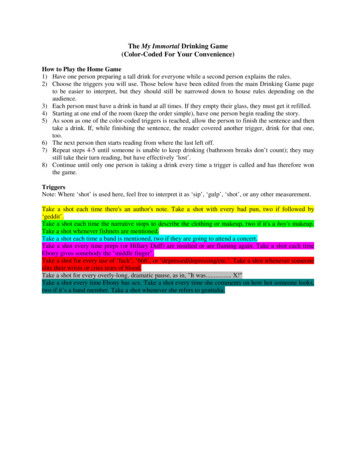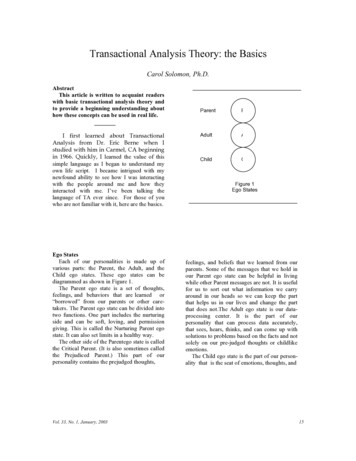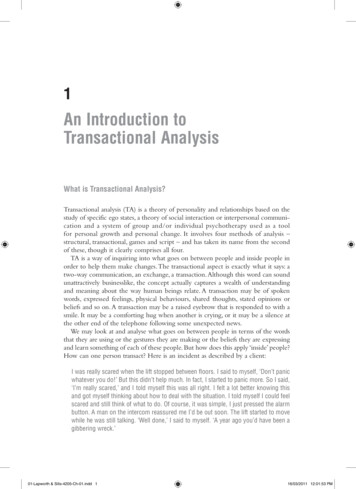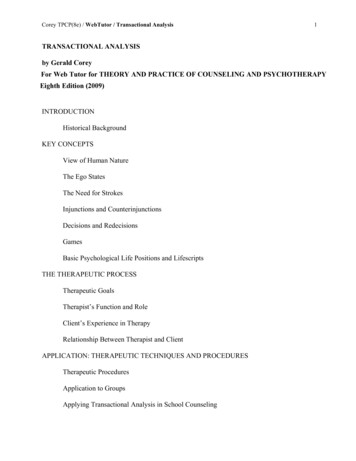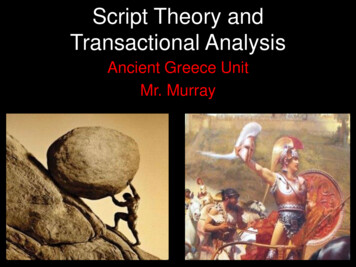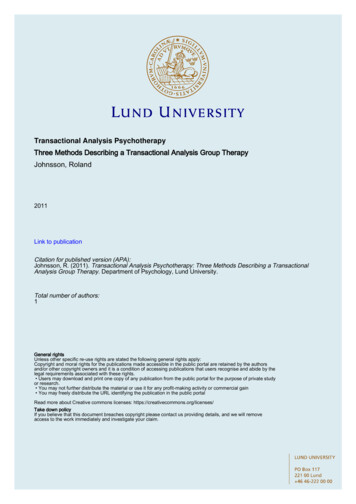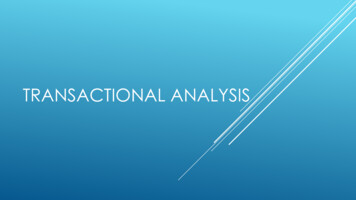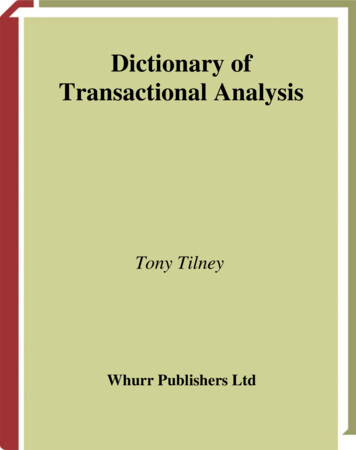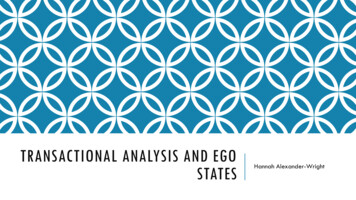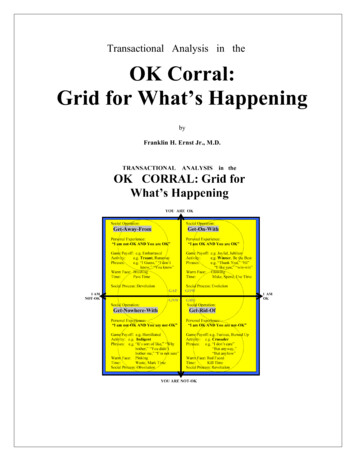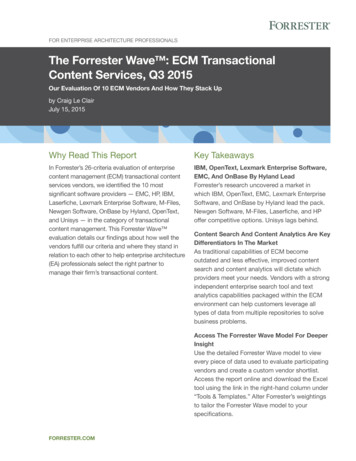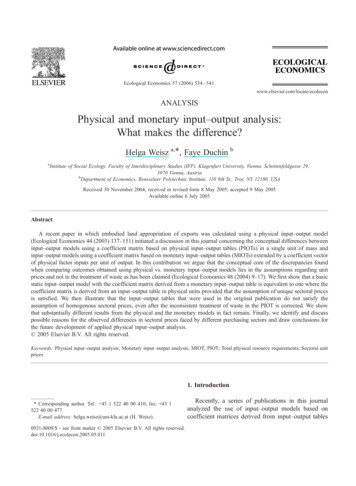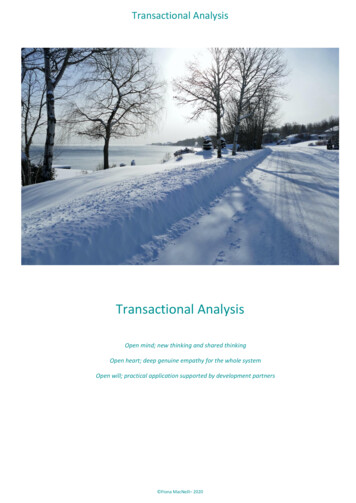
Transcription
Transactional AnalysisTransactional AnalysisOpen mind; new thinking and shared thinkingOpen heart; deep genuine empathy for the whole systemOpen will; practical application supported by development partners Fiona MacNeill– 2020
Transactional AnalysisTransactional AnalysisIt has always been my belief that if we each take responsibility for our impact and are honest enough to hear feedbackthen we can grow as people and as leaders. Transactional Analysis helps us to understand our responses to thecommunication and behaviours of others and to reflect on why we respond the way that we do. We can all get hookedby the communication and behaviours of others, especially if they reconnect with old tapes and patterns of behaviour.Leaders need to minimise the impact of the assumptions that they have about others, maximise listening, andimportantly maximise the impact of leadership communication.In the early 1950s Dr Eric Berne developed a theory about personality development tied to communication, which hecalled 'transactional analysis' (TA). It is a very useful and fascinating framework for analysing the behaviour of bothourselves and other people.Complete the following questionnaire to learn more.2 Fiona MacNeill Associates 2018
Transactional AnalysisPersonal Styles QuestionnaireThe personal styles questionnaire begins to give you some insight into how values and beliefs and the associated thinkingand behaviour patterns have an impact on your communication preference. This is an overview only and it is importantto realise that there are advantages and limitations to all the preferences.Please approach this in your “work” frame of mind, especially how you are with colleagues, people you lead and yourleader. For each statement allocate a score to show how much the behaviour is like the way you behave - go with yourgut reaction and enjoy it!Scoring Guidance0 Not true for me1 Sometimes true for me2 Generally true for me3 Nearly always true for me1. I am firm in terms of behaviour that I consider acceptable/unacceptable2. I tend think things through thoroughly before making a contribution or taking action3. I believe that I should do as I am asked4. I behave sympathetically towards people with problems5. I really enjoy being with other people6. I enjoy taking care of people7. I enjoy solving problems in a systematic and logical way8. I am comfortable telling people what to do9. I let people know how I really feel without embarrassment10. I follow social norms in terms of expected behaviours11. I can sometimes be unpredictable12. I frequently find myself supporting new people or people new to a role13. I can stay calm in a crisis14. When I know I’m right I insist that others listen to me15. I ask a lot of questions16. I am passionate and excited about my work17. People seem to expect me to know the answer18. I pride myself that it is my role to take care of my people3 Fiona MacNeill Associates 2018
Transactional Analysis19. I am uncomfortable with upset or conflict20. I keep on thinking logically even under pressure21. My working style is systematic, methodical and organised22. It is important to me that I fit in23. I will often do things myself, rather than taking the time helping others to learn24. I can quote my previous experience when problems occur25. People tell me I’m creative and inventive26. I prefer to take control rather than follow someone else’s lead27. I can get over involved with people’s personal lives28. I’m over-emotional compared to others around me29. I expect my manager to set my terms of reference30. I take all points of view into account when making a decision31. I encourage people to test their own capabilities32. People complain I’m bossy33. I spend time enjoying myself34. I will go out of my way to look for what’s good in people35. I’m noted for my even temper and balanced comments36. I need people to understand how I am feeling to gain reassurance37. I have taken on the work of others38. I often over analyse and get absorbed in detail39. People do as I tell them40. I have agreed to and followed through on things that I didn’t agree with4 Fiona MacNeill Associates 2018
Transactional AnalysisScoring the QuestionnaireTransfer your scores to the table below against the appropriate question 4036ScoreTOTALSCPNPA5 Fiona MacNeill Associates 2018ACNC
Transactional AnalysisTransactional AnalysisYou have completed the TA Personal Styles Questionnaire. Berne believed that we are always operating from one orother of the states - in the way we habitually think and behave in response to life's stimuli. There are three 'ego-states'in which we think and behave as the Parent (CP Controlling Parent, NP Nurturing Parent), the Adult (A) or the Child (ACAdapted Child and NC Natural Child). These states are developed over our life and the influences, footprints andexperiences form our values and beliefs, our thinking, including our thinking about leadership and our associatedleadership behaviour.We all operate in all the states, but we may be in some more than others. There is nothing wrong with being in aparticular state: no one state is 'better' than the others. However, we may find it more helpful in achieving our outcomesto be in a particular state at a particular time - what we need is to get our state right for the current situation, constantlyasking if we are in the right state for the transaction we are dealing with.We are often asked about the perfect score. There is no such thing, only the patterns of communication that areeffective, engaging those you lead to also taking ownership and responsibility for the future. The numbers represent thefrequency with which you use each of the communication preferences. The bigger the gap between your top preferenceand the next represents the strength of the preference.6 Fiona MacNeill Associates 2018
Transactional AnalysisParent StateThe parent in TA is the set of recordings in a person's mind of imposed, unquestioned, external events perceivedbetween birth and age 5 years. They are derived mostly from parents' (or parental figures') speech and behaviour admonitions, punishments, cuddles, encouragement. Berne says they are permanent and cannot be erased, and atintervals throughout our lives they will be played back and influence our behaviour.It is sometimes described as 'Life as it is taught'.When behaving in our parent state we can be judgemental, tradition-oriented, regulatory and conventional;alternatively, we may be supportive and protective. We think, feel and do as the 'parent figure' did - with views of rightand wrong, good and bad, and how we should behave, e.g.; 'be strong', 'don't show your feelings', 'do as you're told','feel responsible'. The parent state can be broken down into two aspects: controlling and nurturing parent.The types of behaviour we display when we are operating in our parent state are:As a Controlling Parent (CP)BehavioursWordsSets limits/boundariesshouldDisciplinesalwaysKeeps traditionsneverJudgesoughtCriticisesmustMakes rulesYou as a Controlling ParentWhen do you think and behave in this way?How does this help you?When is this appropriatewith your team?As a Nurturing Parent (NP)BehavioursWordsGives advicelet meCoaches/developsdon't worryProtectsit will all be fineComfortswhat do you need?EncouragesI can show you how to NurturesYou as a Nurturing ParentWhen do you think and behave in this way?How does this help you?When is this appropriatewith your team?You as a Controlling ParentWhen you think and behave in this way What assumptions areWhat is the impact onyou holding about others?engagement, innovationand customer focus?You as a Nurturing ParentWhen you think and behave in this way What assumptions areWhat is the impact onyou holding about others?engagement, innovationand customer focus?7 Fiona MacNeill Associates 2018
Transactional AnalysisChild StateThe child in TA consists of recordings of internal events (feelings) experienced in the first five years of life in response toexternal events. Berne says that, like parental recordings, those in the child are permanent and can easily be triggeredby events in adult life so as to influence behaviour. When behaving in our child state we think, feel, do as we did whenwe were small - we are free/natural, creative, experimental, joyful, playful - we are obedient, rebellious, insecure,anxious, scared - adaptive so our needs are met. It is sometimes known as 'Life as it is felt'. The child state can bebroken down into two aspects: natural/free and adapted child.The types of behaviour can display when we are operating in our child state are:As an Adapted Child (AC)BehavioursWordsObedientNo chance/I’ll tryConditioned/conventionalPlease/thank youresponsesSorry/I don’t care!InsecureI can’t do that/I won’t doAnxious/scaredthatSullen/rebelliousI’m only a The organisation says.You as an Adapted ChildWhen do you think and behave in this way?How does this help you?When is this appropriatewith your team?As a Natural Child (NC)BehavioursWordsAsks questionsI’m wondering?Natural/freeI’m curious?Creative/InnovativeI want toExperimentalmineJoyfulwon'tLacks boundariesscaredSelfishfantasticYou as a Natural ChildWhen do you think and behave in this way?How does this help you?When is this appropriatewith your team?You as an Adapted ChildWhen you think and behave in this way What assumptions areWhat is the impact onyou holding about others?engagement, innovationand customer focus?You as a Natural ChildWhen you think and behave in this way What assumptions areWhat is the impact onyou holding about others?engagement, innovationand customer focus?8 Fiona MacNeill Associates 2018
Transactional AnalysisAdult StateThe third state, adult, is the last one to develop, beginning at around 10 months of age. It is formed from data acquiredand computed through exploring, thinking out and testing ideas. We use the data stored in our parent and child statesas information with a similar standing to that which we experience in the 'real' world - comparing and testing it to makeit fit other knowledge. We then store it in the adult, leaving the parent and child recordings unaltered. It is sometimesknown as 'Life as it is tested'. When behaving in our adult state we operate in the 'here and now'; are rational andunemotional. We seek information, respect other people, and are assertive and considered in our communication.As an AdultBehavioursAsking questions to gatherdata/informationAnalyticalRational and sCheck itSolutionsYou as an AdultWhen do you think and behave in this way?How does this help you?When is this appropriatewith your team?You as an AdultWhen you think and behave in this way What assumptions are you holding about others?What is the impact on engagement, innovation andcustomer focus? Fiona MacNeill 2020
Transactional AnalysisThinking about your interaction with others - Effective TransactionsPositive Nurturing Parent - communicates the message "You're OK". When in this mode the person is caringand affirming.Positive Controlling Parent - communicates the message "You're OK". This is the boundary setting mode,offering constructive criticism, whilst being caring but firm.Positive Adapted Child - communicates an "I'm OK" message. From this mode we learn the rules to help uslive with others.Positive Natural Child - communicates an "I'm OK" message. This is the creative, fun loving, curious andenergetic mode.Adult Accounting mode - communicates "We're OK" messages.The Adult is able to assess reality in the here and now. When in Adult mode it is possible to choose which ofthe other effective modes to go into, dependent on the situation. When stable in this mode we are then ableto respond appropriately, rather than flipping into archaic or historic ways of being, thinking and behavingwhich could be inappropriate and unhelpful.Thinking about your interaction with others - Ineffective TransactionsNegative Controlling Parent - communicates a "You're not OK" message, and is punitive.Negative Nurturing Parent - communicates a "You're not OK" message. When in this mode the person willoften do things for others which they are capable of doing for themselves. When in this mode the person isengulfing and overprotective.Negative Adapted Child - expresses an "I'm not OK" message. When in this mode the person over-adapts toothers and tends to experience such emotions as depression, unrealistic fear and anxiety.Negative Natural Child - in this mode the person runs wild with no restrictions or boundaries. In this modethey express a "You're not OK" message.When we are dealing with others, operating in particular states is likely to generate particular responses fromthem. For example, a controlling parent is likely to 'hook' an Adapted Child (or possibly another controllingparent). Let's look at a specific transaction between two people. If a facilitator of a learning sessions says toyou after an exercise: 'That was a very disappointing piece of work: I would have expected better from you'(from their Controlling Parent state) - what is your response likely to be? First, examine how are you feeling it is quite likely that you are feeling a mixture of emotions. Perhaps, you feel upset and worried and mayrespond with: 'I'm so sorry, I just could not get the hang of what you wanted - I was trying hard, really' perhapsin a rather distraught or whining voice. On the other hand you may feel rather rebellious: 'Who does she thinkshe is, commenting like that?' You may then well respond: 'What was wrong with it?' in an angry and resentfulvoice. Both of these responses are from your adapted child state. It might just 'hook' your own ControllingParent state so that you respond with 'You should not speak to me like that.'None of th
Transactional Analysis helps us to understand our responses to the communication and behaviours of others and to reflect on why we respond the way that we do. We can all get hooked by the communication and behaviours of others, especially if they reconnect with old tapes and patterns of behaviour. Leaders need to minimise the impact of the assumptions that they have about others,
